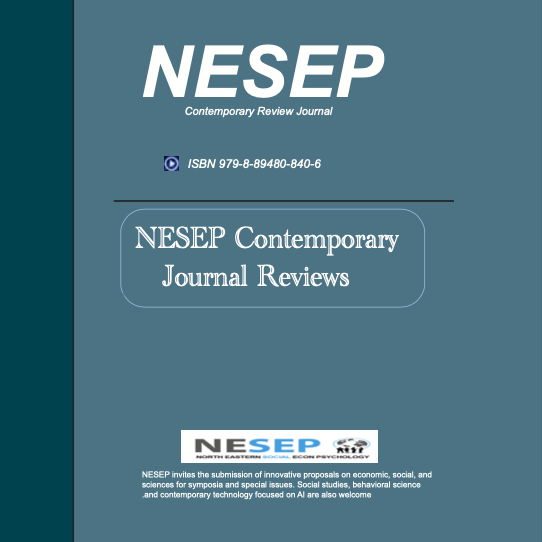Accepted Articles
We congratulate you on acceptance of your manuscript.

Annual Expo by the Journal of Young Explorers Meta and NESEP
- Fundamental or applied research
- Interdisciplinary research
- Judging on a rolling basis
- A work-in-progress research
- Completed research
- Unlimited topics and ideas
- ISBN 979-8-89480-840-6
- NESEP/NY-CSEF event at Harvard Club in NYC
The Effect of Environmental Awareness and Education on Motivations in High School Students to Counteract Climate Change
Abstract: Ever since the scientific community has identified increasing levels of global warming, the necessity for public education and awareness has become apparent. While individual efforts to mitigate climate change may seem fruitless, they are a crucial parameter to measure interest in and compassion for the environment, and they prove influential in global carbon emissions and energy usage. Previous research has supported the notion that one’s sustainable behaviors are correlated with one’s knowledge of ecological concerns. The present study administered environmental awareness surveys, in which high school participants’ knowledge was compared to their behaviors. Additionally, optional interviews provided a deeper insight into the perspectives of the causes, impacts, and implications of climate change. The departing survey furthered an exploration of the impact that education has on individuals’ views of climate change. While a causational relationship was not determined between environmental knowledge and behavior, both qualitative and quantitative data collected support a correlation between the two. Implications for future research include investigating the link between knowledge of sustainable behaviors and one’s motivation to engage in sustainable behaviors, as well as the connection between environmental knowledge and eco-anxiety. Ultimately, this research aids the discussion about strengthening environmental education, including education on sustainability practices.
References
-
Barrón, N. G., Gruber, S., & Huffman, G. (2022). Student engagement and environmental awareness: Gen z and ecocomposition. Environmental Humanities, 14(1), 219-232. https://doi.org/10.1215/22011919-9481528
-
Bostrom, A., Hayes, H. L., & Crosman, K. M. (2018). Efficacy, action and support for reducing climate change risks. Risk Analysis, 39(4), 805-828. https://doi.org/10.1111/risa.13210.
-
Breen, R. (2021). The evil fashion giant: Shein and the perpetuation of overconsumption. Podcast Perspectives of Environmental Geopolitics. https://opentext.ku.edu/environmentalgeopolitics/chapter/evil-fashion-giant-shein/##renzt ranscript. Center for Climate and Energy Solutions. (2022). U.S. emissions. https://www.c2es.org/content/u-s-emissions/.
-
Costley, D. (2022). Climate change made global summer droughts 20 times more likely. PBS. https://www.pbs.org/newshour/science/climate-change-made-global-summer-droughts-20 -times-more-likely#:~:text=Drought%20that%20stretched%20across%20three,according %20to%20a%20new%20study.
-
Dempster, G., Sutherland, G. and Keogh, L. (2022). Scientific research in news media: a case study of misrepresentation, sensationalism and harmful recommendations. JCOM, 21(1), 1-23. https://doi.org/10.22323/2.21010206. 21 Goldstein, B.,
-
Gounaridis, D., & Newell, J. P. (2020). The carbon footprint of household energy use in the United States. PNAS, 117(32), 19122-19130. https://www.pnas.org/doi/full/10.1073/pnas.1922205117.
-
Industrial Revolution. (2022, November 14). HISTORY. https://www.history.com/topics/industrial-revolution/industrial-revolution.
-
King, A. (2022). A climate scientist on the planet’s simultaneous disasters, from Pakistan’s horror floods to Europe’s record drought. The Conversation. https://theconversation.com/a-climate-scientist-on-the-planets-simultaneous-disasters-fro m-pakistans-horror-floods-to-europes-record-drought-189626
-
Lopez, G. (2023). A translation problem. The New York Times. https://www.nytimes.com/2023/03/21/briefing/climate-report.html.
-
Lukinović, M., & Jovanović, L. (2019). Greenwashing – fake green/environmental marketing. Fundamental and Applied Researches in Practice of Leading Scientific Schools, 33(3), 15-17. https://doi.org/10.33531/farplss.2019.3.04.
-
Merriam-Webster. (n.d.). Capitalism. In Merriam-Webster.com dictionary. Retrieved January 29, 2023, from https://www.merriam-webster.com/dictionary/capitalism.
-
Miletli, A. (2023). What is the current status of the ozone layer? European Environment Agency. https://www.eea.europa.eu/en/topics/in-depth/climate-change-mitigation-reducing-emissi ons/current-state-of-the-ozone-layer.
-
Nda, M., Adnan, M. S., Abdullahi Ahmad, K., Usman, N., Razi, M., & Daud, Z. (2018). A review on the causes, effects and mitigation of climate changes on the environmental aspects. International Journal of Integrated Engineering, 10(4), 169-175. https://doi.org/10.30880/ijie.2018.10.04.027. 22
-
NOAA. (2022, October 26). Antarctic ozone hole slightly smaller in 2022. National Oceanic and Atmospheric Administration. https://www.noaa.gov/news-release/antarctic-ozone-hole-slightly-smaller-in-2022
-
NOAA. (2022). Earth had its 6th-hottest July and year to date on record. https://www.noaa.gov/news/earth-had-its-6th-hottest-july-and-year-to-date-on-record
-
Ritchie, H., & Roser, M. (2020). CO2 and greenhouse gas emissions. Our World in Data. https://ourworldindata.org/emissions-by-sector.f
-
Shen, M., Huang, W., Chen, M., Song, B. Zeng, G., & Zhang, Y. (2020). (Micro)plastic crisis: Un-ignorable contribution to global greenhouse gas emissions and climate change. Journal of Cleaner Production, 254. https://doi.org/10.1016/j.jclepro.2020.120138.
-
Soares, J., Miguel, I., Venâncio, C., Lopes, I., & Oliveira, M. (2021). Public views on plastic pollution: Knowledge, perceived impacts, and pro-environmental behaviours. Journal of hazardous materials, 412. https://doi.org/10.1016/j.jhazmat.2021.125227.
-
Tam, K., Chan, H., & Clayton, S. (2023). Climate change anxiety in China, India, Japan, and the United States. Journal of Environment Psychology, 87. https://doi.org/10.1016/j.jenvp.2023.101991.
-
UN Environment Programme. (2023, January 9). Ozone layer recovery is on track, helping avoid global warming by 0.5 °C [Press release]. https://www.unep.org/news-and-stories/press-release/ozone-layer-recovery-track-helpingavoid-global-warming-05degc.
-
UNFCCC. (2016). The Paris agreement. https://unfccc.int/process-and-meetings/the-paris-agreement/the-paris-agreement. 23
-
United Nations. (2018, April 20). Do you know all 17 SDGs? [Video]. YouTube. https://www.youtube.com/watch?v=0XTBYMfZyrM.
-
U.S. Energy Information and Administration. (2023). Total energy. https://www.eia.gov/totalenergy/data/monthly/index.php#environment.
-
United States Environmental Protection Agency. (2022). Sources of greenhouse gas emissions. https://www.epa.gov/ghgemissions/sources-greenhouse-gas-emissions.
-
Wang, H., Safer, D. L., Cosentino, M., Cooper, R., VanSusteren, L., Coren, E., Nosek, G., Lertzman, R., Sutton, S. (2023, January 23). Coping with Eco-Anxiety: An Interdisciplinary Perspective for Collective Learning and Strategic Communication. The Journal of Climate Change and Health. https://doi.org/10.1016/j.joclim.2023.100211.
-
The World Bank. (2019). How much do our wardrobes cost to the environment? https://www.worldbank.org/en/news/feature/2019/09/23/costo-moda-medio-ambiente#:~: text=Every%20year%20the%20fashion%20industry,needs%20of%20five%20million%2 0people.&text=The%20fashion%20industry%20is%20responsible,flights%20and%20ma ritime%20shipping%20combined.